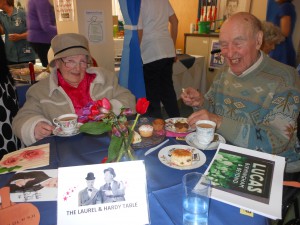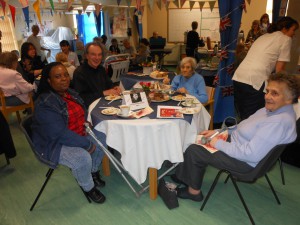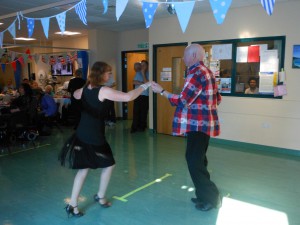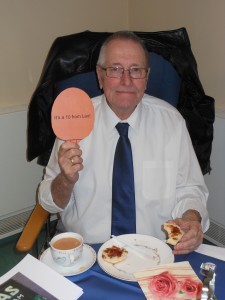Around one in twenty people living in the United Kingdom will develop bowel cancer during their lifetime (source: www.nhs.uk). The sooner bowel cancer is detected before symptoms come about, the better the chances are of recovering from the disease.
It is the second most common cause of cancer death in the United Kingdom and is a term used to describe cancer that begins in the large bowel. Cancer can also start in the small intestine but small bowel cancer is rare.
April is Bowel Cancer Awareness Month encouraging people to talk about the disease with family, friends, workmates or neighbours. Bowel Cancer Awareness Month is also an opportunity to raise awareness of bowel cancer screening. Screening is the best way of detecting bowel cancer at an early stage.
So what are the initial symptoms to look out for?
- Blood in your stools (faeces) or bleeding from your rectum
- Changes in your normal bowel habits, such as diarrhoea or constipation, which persevere for more than three weeks
- Stomach pain
- Unexplained weight loss
If you have any of the above symptoms, see your GP. Sharon West, specialist bowel cancer screening practitioner at our Trust, says: “Support and advice will always be available to those who have been diagnosed. Friends and family can be a powerful support system and talking to others who are in the same situation can be a good way to learn about the condition. Reading about symptoms and treatments will also help in gaining a better understanding of the disease.”
Undergoing surgery, chemotherapy and radiotherapy are some of the treatments available to help tackle bowel cancer. People can also receive biological therapy treatment. Biological therapies are drugs that can help the body control the growth of cancer cells.
What can be done to beat bowel cancer? Sharon says: “People who exercise for at least 150 minutes a week will have a lower risk of developing bowel and other cancers. An increase in physical activities will help to keep your weight under control and lower the risk of cancer developing.
“Another step you can take in order to prevent bowel cancer is to have regular screenings. Men and women aged 60-74 who are registered with a GP will automatically be sent an invitation for screening through the post. Those who are aged over 74 can opt in by calling the bowel cancer screening helpline on 0800 707 6060.
“Eating plenty of fresh fruit and vegetables as well as whole grains can help minimise the risk of getting bowel cancer. Avoid having a high sugar diet. For British Asians, eating jelabis and sweetmeats regularly can not only lead to you having bowel cancer, you could also develop other types of cancer and heart disease.”
For more information on bowel cancer, please visit: http://www.bowelcanceruk.org.uk/
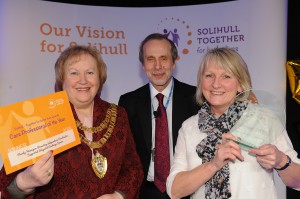 Staff and projects at Heart of England NHS Foundation Trust have received a raft of nominations in the second Solihull Together for better lives Awards.
Staff and projects at Heart of England NHS Foundation Trust have received a raft of nominations in the second Solihull Together for better lives Awards.
Organisers today released details of the finalists for the 2016 Awards after receiving over 100 nominations from Solihull residents, professionals and local organisations – twice as many nominations as last year.
The awards were created in 2015 by the Solihull Together for better lives partnership: NHS Solihull Clinical Commissioning Group, Solihull Metropolitan Borough Council, Heart of England NHS Foundation Trust, Birmingham and Solihull Mental Health NHS Foundation Trust, West Midlands Ambulance Service, Solihull voluntary and community sector and lay members representing people using their services, their carers and the wider Solihull community.
For 2016 the awards are celebrating the work of individuals and organisations who provide outstanding care and support to adults in Solihull.
Among the category finalists this year are a host from Heart of England NHS Foundation Trust. The Trust has two finalists in the Health Professional of the Year category – Dr Susan Powell, consultant geriatrician at Solihull Hospital and Dr Vijayan Suresh, consultant physician and nephrologist at Solihull Hospital.
In the Care Team of the Year category there are nominations for the Care of the Elderly Team at Solihull Hospital, while the Enhanced Care Team at Solihull Hospital is shortlisted for the Award for Dementia-friendly Service.
Meanwhile, the Solihull Pulmonary Rehabilitation Programme and Discharge to Assess Team are shortlisted for the Award for Collaborative Working. Other nominations for the Trust include the Diabetes & Endocrinology Department’s nod for the Award for Outstanding Customer Experience.
The Solihull Together Chairman’s Award, which is given by the Awards Judging Panel to an individual or organisation that has demonstrated outstanding commitment to improving the lives of Solihull citizens, will be revealed at the ceremony.
The winners will be announced on Thursday 21 April at a special awards ceremony hosted by the Rt Hon Jacqui Smith, Chairman of Heart of England NHS Foundation Trust.
For full details of all the nominations visit http://solihulltogether.co.uk/news
Around 7,000 women in the United Kingdom are diagnosed with ovarian cancer every year, making it the nation’s biggest gynaecological killer, with survival rates amongst the worst in Europe.
Delays in diagnosis is one of the reasons why the UK has some of the worst ovarian cancer survival rates for women in Europe.
The ovaries are a pair of small organs in the female reproductive system that contain and release an egg once a month. The disease is most common in women who are over the age of 50 or after cessation of period i.e. in menopause, although it can affect women of any age.
Mr Raj Saha, consultant gynaecologist at Heart of England NHS Foundation Trust, explains: “The truth is that for many women, they are diagnosed once the cancer is already at a later stage, which makes treatment more challenging. With research showing that only three percent of women being confident about recognising a symptom of ovarian cancer, many women often delay seeking advice.
“Ovarian cancer is particularly difficult to diagnose yet early diagnosis is crucial. The symptoms of ovarian cancer can be similar to those of other conditions such as irritable bowel syndrome, so it can be difficult to recognise. Unfortunately like cervical cancer there is no established screening programme for ovarian cancer. There are early signs to look out for and the four main symptoms to look out for are:
- Persistent bloating or increased stomach size
- Difficulty eating or feeling full quickly
- Needing to urinate more frequently
- Persistent stomach pain
“Ovarian cancer does not have its own screening programme for women, so it is vitally important that women themselves are aware of the symptoms of this cancer, know what changes to look for and when to go and checked by their GP. If you also have a family history of ovarian cancer or breast cancer, there is a chance that it is a result of one of the genes that makes these kinds of cancer more likely. There are several possible causes of ovarian cancer and risk factors such as family history and age, but it’s a disease anyone can get even without these factors.
“There are many ways to minimise your chances of developing the disease including, eating a diet which is low in fat, and high in fruit and vegetables. It is also possible that ovarian cancer may be linked to being overweight. Losing weight through exercise, and having a balanced diet, may help to lower your risk of ovarian cancer.”
Taking combined oral contraceptive pill, procedure like sterilisation are few examples have been found to reduce the risk of developing ovarian cancer. However this cancer is difficult to predict and awareness is the most effective of all measures.
For more information about ovarian cancer, please visit www.ovarian.org.uk.
Patients, visitors and staff at Heart of England NHS Foundation Trust tried out new menus, danced and enjoyed tea and cake as part of a national week-long campaign to raise awareness of keeping well-nourished and hydrated.
During Nutrition and Hydration Week, the Trust encouraged patients, visitors and staff to ‘eat, drink and move’. The catering team held ‘Come Dine With Me’ style taster sessions across all three Trust hospitals – Heartlands, Good Hope and Solihull – where visitors and staff tried patient meals. There is a wide range of meals available, including special menus such as halal, vegetarian and puree options and covering special dietary needs, such as gluten free.
It can be difficult for patients to eat and drink enough when they feel ill and Trust staff are able to identify patients who need help to improve their nutritional intake when they are admitted to hospital. Eating and drinking little and often can help and patients are offered regular drinks and snacks, such as cakes, fresh fruit and yoghurts between meals to help provide all the nutrients they need. A new cake range has just been launched and includes individually wrapped cakes in chocolate brownie, cherry flapjack, carrot cake, fruit cake and lemon drizzle flavours.
Staff encouraged patients to get moving during the week too, with an old-fashioned vintage tea dance. Elderly patients enjoyed tea and cakes served in china cups at movie themed tables, includingthe Errol Flynn and Marilyn Monroe tables. Two dancers from Planet Dance School in Solihull volunteered their time for dancing demonstrations and teaching the patients the basics of ballroom dancing. Organ music was provided by Ted from the arts department.
Thanks to the generosity of patients, visitors and staff who bought raffle tickets during the week, the Trust raised over £700 which will be split between Dementia UK and equipment for therapists to use with patients at Heartlands Hospital. Prizes included a picnic basket, a bottle of champagne, wine, chocolates, candles and toiletries.
Helen Reilly, therapy lead for specialist therapy services at Heart of England NHS Foundation Trust, said: “When patients are in hospital, it’s really important that they have regular access to drinks and snacks. Good fluid intake reduces the risk of falls, confusion, headaches, urinary tract infections (UTIs), and pressure ulcers and pneumonia. Our staff have taken Nutrition and Hydration Week as an opportunity to encourage patients to keep moving and walk around more in hospital, which helps reduce these risks and promotes rehabilitation. Activity also improves appetite, social contact and well-being, which is great for patients.”
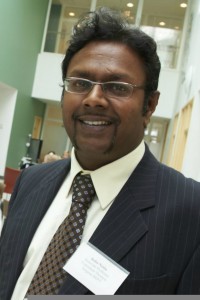 Xbox Kinects could be used in the future to assess the health of patients with conditions such as cystic fibrosis.
Xbox Kinects could be used in the future to assess the health of patients with conditions such as cystic fibrosis.
Normally found in the hands of gamers rather than medics the Microsoft sensors could be used to assess the respiratory function of patients.
Researchers at Heart of England NHS Foundation Trust (HEFT), the Institute of Digital Healthcare, WMG, University of Warwick and the Institute of Inflammation and Ageing and University of Birmingham have developed a method of using the devices. The system consists of four Kinect sensors which are capable of quickly creating a 3D image of a patient’s torso. This enables physicians to measure and assess how a chest wall moves.
In tests it has proven to be as accurate as a patient breathing into a spirometer – the current method used – but providing additional information about the movement of the chest, which could help in identifying numerous respiratory problems.
The project lead, Dr Chris Golby at the Institute of Digital Healthcare, said: “We have developed a low-cost prototype which provides a more comprehensive measurement of a patient’s breathing then existing methods.”
Spirometry the technique most commonly used to lung diseases including chronic bronchitis, emphysema and chronic obstructive airways. It requires a patient to take the deepest breath they can, and then exhale into the sensor as hard as possible, for as long as possible. However it has significant limitations as it doesn’t allow doctors to assess how different areas of each lung function. It can result in inaccurate readings of some patients’ breathing such as older people and children, and those with facial abnormalities or muscle weakness are often unable to form a tight seal around the mouthpiece.
Dr Golby said: “For patients who report to A&E a quick and low-cost method of chest wall motion assessment is required. There are some conditions that doctors can’t detect or assess using spirometry such as collapsed lung segments or respiratory muscle weakness. However our prototype allows physicians to make accurate assessments.
“It is also potentially very useful in assessing changes in respiratory physiology that occur during exercise. This is in contrast with existing systems which rely on data from one viewpoint.”
Babu Naidu, chief investigator and thoracic surgeon at HEFT and clinical scientist at the University Birmingham said: “‘A ‘game changer’ in screening, diagnostics, monitoring therapy and providing bio feedback, the Xbox can be used in any condition affecting breathing.”
Respiratory diseases kill one in five people in the UK and cost the NHS more than £6billion a year. However the proposed system consists of software and four Kinect sensors each of which cost just £100.
The academics trialled their prototype initially using a resuscitation mannequin, then on healthy volunteers and adults with cystic fibrosis. As the Kinect has an infrared beam it allowed them to measure changes in distances across the chest wall. The system uses four sensors which allow measurement of movement from more than one viewpoint. Using off-the-shelf and bespoke software they were able to create a 3D image of a patient’s chest wall.
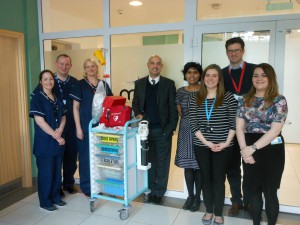 The research department at Heartlands Hospital recently had a visit from Dr Sam Parnia, assistant professor of critical care medicine at the State University of New York in Stony Brook, New York, where he is also director of resuscitation research.
The research department at Heartlands Hospital recently had a visit from Dr Sam Parnia, assistant professor of critical care medicine at the State University of New York in Stony Brook, New York, where he is also director of resuscitation research.
Dr Parnia leads an extensive research programme in emergency and critical care medicine and has a particular interest in resuscitation of the critically injured brain during cardiac arrest and the post-resuscitation period. He established the AWAreness during REsuscitation (AWARE) international research network in 2008. Heartlands Hospital critical care research department is part of the network and has recruited 16 patients so far into the AWARE-II study.
The AWARE-II study looks at the memories and thought processes of patients who have had a cardiac arrest and their relationship with real-time markers of the quality of brain resuscitation. A number of recent studies have indicated that 10% of cardiac arrest survivors report memories and thought processes from their period of resuscitation. It is possible that patients who are able to recount these experiences may have better patient outcomes in terms of reduced brain damage, improved functional ability and better psychological adjustment to the event.
Dr Parnia spent the morning with the Heartlands Hospital critical careresearch team and said: “I have had the pleasure of working with Professor Gavin Perkins and the outstanding research team at Birmingham Heartlands Hospital for almost five years. During this time, we have successfully pioneered the use of novel non-invasive methods to study brain resuscitation. Today, Heartlands remains an integral site in our international multi-centre network of hospitals that are actively engaged in the study of brain resuscitation and human consciousness during cardiac arrest. I wanted to personally meet the whole team and thank everyone at the hospital for their tremendous efforts.”
Professor Gavin Perkins, Warwick Medical School and Heart of England NHS Foundation Trust NIHR Senior Investigator, said: “We were delighted to welcome Dr Parnia to Heartlands Hospital. His work is ground-breaking and we are proud to be one of the centres involved in the AWARE-II study.”
If you want to find out more about taking part in research, please contact the HEFT research and development team on 0121 424 3631.
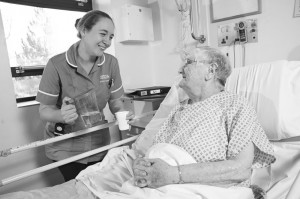 Location: Birmingham Heartlands Hospital B9 5SS
Location: Birmingham Heartlands Hospital B9 5SS
Venue: Medical Day Hospital
Date: 19th March 2016 from 10am to 4pm
Description: Do you have a current, active nursing (NMC) pin?
Are you an experienced registered nurse who has the passion, dedication and commitment to provide excellent clinical care, in an emotionally charged and exciting elderly care environment?
Are you a newly qualified nurse who desires to work in a frequently changing setting, across multiple specialties – dealing with acute and chronic health issues for our the aging population?
Come and talk to us at our open day on Saturday 19 March 2016, where we are showcasing the career opportunities across our elderly care services.
The day will include:
- Simulation sessions – to gain an understanding of sensory impairments and have a glimpse into the patient experience.
- Our dementia quiz – learn about our Dementia Vital and Dementia Friends pieces of work.
- A presentation outlining our excellent elderly care nurse development programmers (including top-up degree, academic accreditation and pathways into advanced nursing practice in elderly Care)
- ‘Get it on Time’ Parkinson Disease Project – step into our 1920-30 living room.
- Tours of the different services; Rowan Ward – medically fit for discharge, Ward 21 – elderly care assessment unit and Ward 30 – focus on elderly frail patient
- Our reminiscence pod – take a step back in time.
- Specialist interview panels on the day for those who have been shortlisted. (A nursing drugs calculation test will be part of the interview process).
- Letters of conditional offers of appointment for successful candidates will be given on the day.
Click here and watch ‘Experience 12 Minutes in Alzheimer’s Dementia’ a short glimpse of what a loved one with dementia maybe going through.
Find out more about the career opportunities on offer, attend our open day at:
Birmingham Heartlands Hospital
Education Centre
Bordesley Green Road
Birmingham
B9 5SS
For more information and to apply for interviews on the day, visit the NHS Jobs website and search using the reference number: 295-3R1088BB
To discuss the career opportunities further please call and speak to one our nurses below:
Rowan Ward – contact Sister Annie Williams on 0121 42 43541.
Annie.williams@heartof England.nhs.uk
Ward 21 – contact Sister Julia Melton on 0121 42 40221.
Julia.melton@heratofengland.nhs.uk
Ward 30 – contact Sister Karen Segovia on 0121 42 40230.
Karen.segovia@heartofengland.nhs.uk
www.jobs.nhs.uk
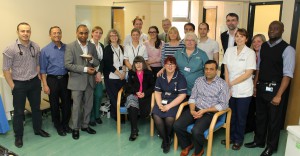 Patients at Heart of England NHS Foundation Trust are benefiting from a new service that sees 43% more patients admitted to a specialist stroke bed within four hours to receive the lifesaving care they need in the first 72 hours after a stroke.
Patients at Heart of England NHS Foundation Trust are benefiting from a new service that sees 43% more patients admitted to a specialist stroke bed within four hours to receive the lifesaving care they need in the first 72 hours after a stroke.
Heartlands Hospital now manages all emergency stroke admissions across the Heart of England NHS Foundation Trust in its new Hyper Acute Stroke Unit (HASU), and 81% of patients are admitted within the four hour standard, compared to 38% in 2014. The team sees patients from across Birmingham, Solihull, Sutton Coldfield, South Staffordshire and Warwickshire.
Not only has this led to significant improvements in care for patients, including quicker administering of a life-changing drug to stop further blood clots and access to a multi-disciplinary team at one hospital site, it’s has also meant that the hospital has been rated as level A by the Sentinel Stroke National Audit Programme (SSNAP), one of only two Trusts in the region that hold an A rating. This is a huge improvement from a D rating in 2014. SSNAP clinical audit scores stroke teams on 44 aspects of care – from when a patient arrives at hospital to when they are discharged.
There are 30 stroke beds at Heartlands, made up of 16 hyper acute and 14 acute beds, plus a further 15 acute beds at Solihull and 22 acute beds at Good Hope Hospital. Once the patient is stable, they are discharged home or transferred back to an acute bed at their local hospital if they require rehabilitation.
The team see between 5 and 20 new patients a day, making it one of the biggest and busiest centres in the UK.
Matthew Cooke, deputy medical director at Heart of England NHS Foundation Trust, said: “Our staff have worked incredibly hard to make these important changes to our stroke service and I’d like to thank them for their efforts. They have made significant improvements for our patients, leading to better outcomes for seriously ill patients and meaning more people are going home without any disability after a stroke.”
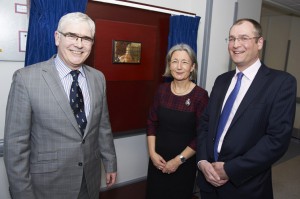 A trailblazing surgeon who became the first female President of the Royal College of Surgeons has ‘cut the ribbon’ on a state-of-the-art operating theatre at a Birmingham hospital which is already providing great benefits to patients.
A trailblazing surgeon who became the first female President of the Royal College of Surgeons has ‘cut the ribbon’ on a state-of-the-art operating theatre at a Birmingham hospital which is already providing great benefits to patients.
Clare Marx was the guest of honour as she officially opened the new £4 million hybrid operating theatre at Heartlands Hospital, part of Heart of England NHS Foundation Trust.
The theatre, one of only three of its kind in the UK and a first in the Midlands, opened its doors to patients last autumn and as a result opened the door for world class treatments and training at Heartlands.
Miss Marx said she was ‘extremely impressed’ with the new facility and stressed it was important for investment to continue in new technology and improving patient care.
She said: “I was pleased to be asked to open this wonderful new facility – it is terrific for the patients and also for the staff as it is a world class environment for them to work in.
“I believe it is vitally important that we continue to invest in improving our services with new technology and striving to be the best. We should aim to be the place in Europe where the most talented people want to train and work, as well as to provide the best possible care for the communities we serve.”
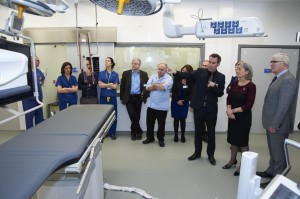 The theatre centres around the GE Discovery 740 robotic machine which utilises 3D technology and can be used for a range of specialist procedures including keyhole endovascular aneurysm repair.
The theatre centres around the GE Discovery 740 robotic machine which utilises 3D technology and can be used for a range of specialist procedures including keyhole endovascular aneurysm repair.
The development has supported the hospital to become the regional centre for vascular surgery, as well as make room for an expansion of the hospital’s interventional radiology service.
Martin Claridge, clinical director for vascular surgery at the Trust, said: “The hybrid theatre has already made a massive difference to the patients we are able to treat, as well as increasing surgical capacity across the Trust for all specialties so it really has been win-win.
“We have the busiest complex endovascular service in Europe achieving outstanding results and this world class facility enables us to treat our patients in a safe high quality environment and gives us so many opportunities in terms of training the next generation of vascular surgeons.
“It has been fantastic to have Clare visit and officially open the theatre and see first-hand how exceptional this facility is and we were able to showcase just what it offers for the hospital and for our patients.”
 Locals interested in learning more about common thyroid issues have the chance to hear from a Solihull specialist when the Hospital hosts a talk on the subject.
Locals interested in learning more about common thyroid issues have the chance to hear from a Solihull specialist when the Hospital hosts a talk on the subject.
Taking place on Tuesday 15 March at Solihull Hospital at 5pm, Dr Andrew Bates, consultant endocrinologist at Solihull Hospital, will answer questions from the public to outline aspects of thyroid related issues, including causes of thyroid, what health changes patients should look out for and what new methods of treatment are currently available.
The thyroid gland is found in the neck and produces hormones that are released into the bloodstream to control the body’s growth. Thyroid disease is common and affects millions of people in the United Kingdom.
Dr Bates said: “Around one in three of all patients in the UK suffer from thyroid problems, either underactive or overactive so it is important we get the message out in terms of what symptoms both men and women need to look out for. An overactive thyroid can make a person feel nervous and experience unexpected weight loss whereas an underactive thyroid can make a person feel tired, put on weight and feel depressed.
“I hope that by hosting the seminar, locals will be encouraged to come along to learn more about thyroid and play a part in raising awareness about the condition.”
If you would like to attend the seminar, please contact Sandra White, membership and community engagement manager, on 0121 424 1218 or email: membership@heartofengland.nhs.uk.
The Trust – which covers Heartlands Hospital, Solihull Hospital and Good Hope Hospital as well as some community based services – runs monthly health seminars to help raise awareness of a range of health conditions, as well as providing information about the treatment and support that is available.

